Campus Activities Complex
The Campus Activities Complex (CAC) concluded one of its busiest years in history, focusing on implementing its new mission and strengthening core activities. In an effort to improve quality and customer service, CAC completed three major initiatives of its mission in collaboration with stakeholders and advising groups. These included the application of an event fee program, designed to generate new revenue in support of program quality, revitalization of the Stratton Student Center (W20) as a focus for student and community life, and execution of the new dining model incorporating a multi-contractor configuration, upgrading dining facilities, and improving food quality.
The CAC is accountable for providing the environment where the MIT community comes together, formally and informally, to interact and grow. The mission of the CAC is to:
- Ensure the upkeep, safety, functionality and access to the facilities under our stewardship
- Provide the MIT community basic, everyday life services through retail, dining and service operations
- Enhance the quality of community interaction through professional logistics, scheduling, and production services
In everything we do we advance the values of personal and group responsibility, fairness and respect, as well as appreciation for individual differences.
Governance
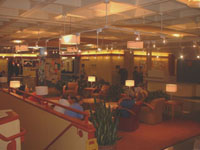 The new Lobby Lounge in the Stratton Student Center |
CAC was assisted in fulfilling its mission by the Campus Activities Complex Advisory Board and the Campus Dining Board. Each board is comprised of representatives from the MIT community including undergraduate and graduate students, faculty, staff, alumni, and parents. Both groups serve the critical role of providing input and perspective into the major decisions affecting the programs while also providing communication links with the community we serve.
Campus Activities Complex Advisory Board
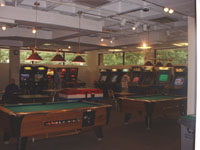 CAC's spacious new Game Room |
The Campus Activities Complex Advisory Board (CACAB) played a pivotal role helping to apply findings contained in 2002 Strategic Review and Physical Space Assessment for Stratton Student Center and Walker Memorial Building. In response, the CAC made it a primary goal to revitalize of the Student Center's first floor program. The board contributed to the design of the new lobby lounge and creation of a new, expanded Game Room program. CAC worked with the existing game vendor and the City of Cambridge to revise the number and variety of games available, introducing the wildly popular Dance Revolution as part of the new mix. In addition, we partnered with student groups to hold tournaments in the space over the past year. These changes have brought significant increases in revenue.
CACAB also spent significant time working with CAC staff to review the Coffeehouse program, and made the decision to eliminate its operating losses, and position the program for a revised future role.
Campus Dining Advisory Board
The Campus Dining Advisory Board (CDAB) provided invaluable counsel on implementing the dining model during its second year of operation. Its membership continued to assist with the shift to the multi-contractor design while providing feedback on food quality and facility improvement programs. The board participated in efforts to expand use of the MIT card to other food providers, develop a communications plan for the campus, and establish the Simmons discount meal program. Based upon its success, the board recommended and received approval to expand the discount program to Baker and Next House Dining next year. Last year, the committee was lead by one person. This year the Board initiated a new chair/cochair leadership team model which allows for two leaders, one representing MIT administration an another representing the MIT student body thereby insuring a broad and thorough perspective on all matters brought forward to the board.
Accomplishments
In accomplishing its objectives, the CAC has relied on cultivating strong partnerships with student leadership, the other DSL units, and other MIT offices.
The retail portfolio within the Stratton Student Center received considerable attention. CAC partnered with the Real Estate Office to address a number of retail issues including revised lease arrangements with new and existing tenants, approval to introduce a game room program into the retail footprint, efforts to expand banking services, and the use of basement retail space to create a new Latino Cultural Center. This willingness to use our retail portfolio in a creative way has significantly increased traffic to the building and its establishments.
Food dominated the first floor renewal with the arrival of Alpine Bagels & Cambridge Grill and Arrow Street Crepes featuring Toscanini's ice cream. These new operators, introduced as part of the campus dining redesign, have attracted significant new business to the building. The vendor changeover in Lobdell Food Court and Morss Hall to Sodexho instituted new menus, server upgrades, and opportunities to better service the MIT community. The transformation of Lobdell further contributed to the Student Center revitalization efforts and complemented LaVerde's acceptance of the MIT Card.
Following years of declining food and beverage sales, the Coffeehouse program, located in the Student Center since 1972, ceased operations. The CAC Advisory Board and the Undergraduate Association, worked with staff to evaluate the program to determine its future. With additional community feedback to verify planning assumptions, the area will remain as the Coffeehouse Lounge, open to the community around the clock as an informal gathering space. No food program is planned for the space at this time, however, two new entertainment series will be offered in the fall 2003, sponsored collaboratively with student organizations and DSL departments. The space will be available during the summer months for scheduling of special functions.
CAC partnered on projects with staff from the Environmental Health and Safety Office which resulted in the mapping of reporting and supervising relationships for operational areas relative to the use of or exposure to hazardous materials. CAC and EHS also focused on effective emergency response programs relative to national emergencies.
Operations, Facilities and Event Management
For 2002–2003, the event management area of CAC provided scheduling and operational support to 11,918 events in which more than 575,000 people participated. Of these events 53 percent were sponsored by student organizations and 46 percent of events were for MIT departments. Other events were individually sponsored, usually for a wedding or memorial service in the MIT Chapel. CAC provided its event support to its own spaces and to most major institute events held campus-wide. This past year was particularly busy with expanded programs for Orientation, Alumni Leader Conference, Family Weekend, Fall Festival, Panhel Recruitment, Campus Preview, Reunions, and Commencement. In addition, we provided support for the Remembrance of 9/11, Campaign Participation events, Sloan's 50th Anniversary, the Whitehead Conference, Charm School, Spring Weekend, and the Despande Center Conference.
The event support fee program was rolled out to the community through a series of communication and meetings. Stakeholders were provided a presentation on the program, its purposes and impacts. Clients now receive estimates before their events, enabling them to budget accordingly. In the second year, the size and number of discounts will decrease. The fee program exceeded its first year goals generating over $100,000. CAC will direct 39 percent of the fee to the Facilities Department to offset the cost of service staff support expense.
To promote better service to the community and make better use of resources, the Event Planning Team trained staff from Sloan School, Student Life Programs, Theater Arts, and the DSL Financial Team in the Event Management System (EMS) software. The Event Planning Team is currently examining possible improvements to the EMS system, including upgrades and next generation software.
Two revenue generating student service areas were placed in close proximity of each other; the Dining Office moved into the CAC office suite. Having these offices close to one another allows for the sharing of information regarding how to maintain the delicate balance between providing service to the customer and generating revenue.
With other space moves and program changes occurring in the Student Center, an area was identified for the development of a new Latino Cultural Center. A former retail space was upgraded to accommodate offices and a conference room/library. The old adjacent Game Room was renovated and will be dedicated as program and social meeting space. A mural, designed and installed by MIT Latino students, has been installed around the exterior wall helping to highlight the value and vitality of the new program.
CAC accomplished a number of improvements to its facilities. The MIT Chapel's Bertoia Art Sculpture is being restored through a grant obtained by the List Art Center. A new lighting system was installed in La Sala de Puerto Rico, providing improved safety and visibility for performance groups on campus. Walker Morss Dining facility is receiving a new inventory of tables and chairs meant to improve the overall quality of the space and support the generation of increased catering in the space.
In partnership with the Facilities Department, other improvements were made: passenger elevators in the building elevators underwent a major overhaul, new entry mats into the building and restoration to the exterior concrete steps and plaza were completed at the Student Center, and in Walker, the overhead lighting in Morss Hall was upgraded providing a much improved environment for events and activities. Finally, the public restrooms in the basement were also improved.
This year, CAC worked with a group of performance-oriented students to form E33, a student organization that offers lighting assistance to groups on campus. CAC provides the students with advising and mentoring support with specific supervision for their training and safety regime. They have also been assisted with formulating an effective operating structure.
In collaboration with Student Life Programs and the Association of Student Activities (ASA), a number of improvements were made to student organization space and the facilities provided for their events and productions. Safety tours were conducted of student offices in Student Center and Walker with general cleanouts of the spaces coordinated with the group thereafter. In Walker Memorial the A Capella groups joined together to share space and build a new production studio. A review of WMBR radio station space resulted in improvements to the ventilation in their suite and will allow for the introduction of air conditioning this summer.
While CAC continues to administer the Locknetics locks for Student Center student activity offices, the programming of the actual locks has moved to the MIT Card Office.
The Source program, located on the first floor of the Stratton Student Center, provided information services for the MIT community and visitors on campus as well as ticket sales for student events. Ticket sales were higher this year than last totaling $67,690.
Talbot House
Talbot House, located in South Pomfret, VT continued to offer retreat and recreation opportunities to members of the MIT community. Over the past year, 40 groups visited Talbot House. This year's promotional poster in the Infinite Corridor, and numerous emails to the MIT community have helped to increase interest in the house.
MIT Mascot
Tim, the MIT beaver, participated in 21 campus events this year including Orientation, the Johnson Games, Family Weekend, Charm School, Campus Preview Weekend, I-Fair and Spring Weekend. The availability of the mascot at scheduled events is being incorporated into the event planning process with new costumes to accommodate a wider variety of functions.
Student Art Association
The program maintained its vitality with the assistance of a temporary coordinator and continued to offer a full range of photography, painting, video and pottery classes. Moneta K. Ho, Nadya A. Direkova, and Joyce C. Wang won the Schnitzer Prize, and their work presented in the Wiesner Gallery during Commencement.
Hobby Shop
The recent addition of Roy Talanian as a part-time technical instructor enabled the Hobby Shop to increase its hours and course offerings. In addition, the installation of three new machines broadened the shop's capabilities. Among the new offerings were two classes centered on the OMAX water jet: 2.993 Paths to Peace (fall) gave students an opportunity to learn the process of designing, engineering and manufacturing a detailed inlaid tile. The completed projects were presented in a public exhibit. The course SP.777 Water Jet Technology (spring) allowed students to design and build educational puzzles for developmentally disabled students, in participation with the Protestant Guild Learning Center.
A new resident-based Freshman Advisory Seminar was added in the fall. The group, comprised of eight students from Next House, identified problems with their dorm space and then designed and built practical solutions. During IAP, the Second Summer Design Class 2.971 was lengthened to 4 weeks. Also offered during that time were Introduction to Woodworking, Speaker Building, Basic Machine Shop Skills and several workshops. It should be noted that CAC was able to successfully adapt our Speaker Building class to accommodate a student in a wheelchair. In the spring, the Hobby Shop hosted a project-building course delivered by the Green Islamic Society of Boston. This successful project teamed youths from the Cambridge Mosque with MIT graduate students.
CAC recently established an Athena list "Hobbyshop-News" which anyone can join and receive schedule and other shop information. This summer, the Hobby Shop has expanded its evening hours and offered more classes to accommodate student and staff interest and time constraints.
Office of Campus Dining
Campus Dining's year has been one of great progress and positive results in establishing a core infrastructure of attractive facilities, new contractor and restaurateur relationships, and an open and positive dialogue with students and the MIT community. These efforts proved successful as evidenced in the student opinion published in the Institute's Senior Survey.
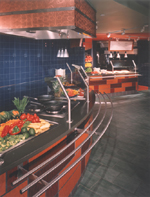 Next House Servery Tray |
An aggressive facility improvement process has been largely completed with successful renovations to Next House Dining, Lobdell Food Court, Alpine Bagels/Cambridge Grill, Arrow St. Crepes, the Bio Café, and Walker Memorial. In addition, the Faculty Club also underwent extensive renovations and restoration including creating a new office to meet with prospective clients, new kitchen production areas, new carpet, and new furniture. With Baker Dining, the Next House renovation, and the addition of Simmons Hall Dining, MIT's Residential Dining program is arguably one of the finest in the nation.
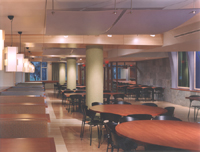 Next House New Dining Room |
The dining fee developed last year with Simmons Hall students was implemented. The plan calls for students to pay a per-semester fee that they earn back through discounts on their dining hall purchases. This has greatly increased dining hall patronage and increased perceived value for students. As a result of this innovative approach, students have a sense of ownership of their dining hall. Furthermore, students are eating better-balanced meals, more often, in an atmosphere of camaraderie between fellow students as well as dining staff. In response to the recommendations of the Campus Dining Board and the efforts of Housemasters and house student governments, this same dining fee approach will be rolled out at Baker House and Next House this coming fall.
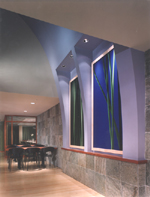 Next House Art Wall |
This past year MIT also began providing Halal dinner meals for Muslim students at Baker Dining. The cooperation between Jewish and Muslim students in developing dining proposals and the success of the Halal food program was praised by the Boston Globe.
MIT also introduced Bosworth's Café in Lobby 7 adding yet another example of extraordinary design to MIT's variety of dining options. Bosworth's elegant design represents a significant enhancement in welcoming visitors to MIT's famous entrance.
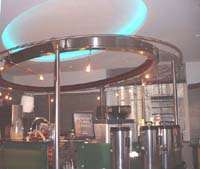 Bosworth's Café in Lobby 7 |
With inviting new facilities and greater contractor responsiveness (encouraged through increased competition), quality of service, variety and value will continue to improve. Contractors continue to adapt and revise their programs in response to changing community needs and preferences. Whether it's a sushi bar, stone oven pizza, fresh from-scratch bagels, or a vegetarian crepe, MIT's dining choices have never been greater or more convenient. It should be noted that due to changes in occupancy and space use in building E19, the East Side Café was closed at the end of the fall term. However, the new Bio Café, Walker Dining, a new vending program and future Stata Center dining location, the staff in E19 will continue to have a variety of dining options.
Finances in Campus Dining have improved markedly. Most contractors now contribute positively to the costs of operating the Office of Campus Dining and other obligations to maintain programs and facilities. This is in contrast to the losses of past years.
CAC Administrative Changes
DSL's Shared Administrative Services evolved last year to include Financial Services that are now being delivered to CAC through central DSL. The centralized services model suggests that through use of Financial and OD/HR expertise, CAC and all other units in DSL will become increasingly effective in its delivery of programs. As such, our financial person has moved to DSL Administrative Services and, with the guidance and expertise of the Administrative Services' leadership, continues to enable our financial and OD/HR management.
Finances/Funding
CAC completed the year with a successful implementation of the event fee program with revenue exceeding targets. Reserves were also used effectively to balance budget shortfalls.
To support the multicontractor model in Campus Dining, changes in account structures were developed in partnership with DSL Administrative Services. Chief among these changes was to establish new sets of accounts for each contractor, clearly determining responsibility for operating expenses as well as capital reserves available in each contractor's respective area. New mechanisms to account for commission revenues paid by contractors to MIT also were established to improve the overall financial picture for Campus Dining. To that end, $1.5 million was invested by MIT's new contractor partners in facility renovations, further facilitating the rapid changes to campus facilities this year.
Collaborative efforts with the MIT Card Office have included full conversion to web-based meal plan enrollment, expansion of the card system to Passport's Restaurant in Sydney and Pacific, implementation of the discount program at Simmons Hall as well as the large conversions and expansions of point-of-sale devices across campus fundamental to Campus Dining growth.
Personnel
CAC promoted two staff members during the past year. Jennifer Smith expanded her event responsibilities, elevating her to manager of event planning. Claudette Palmer was promoted to manager of night operations following the departure of Keith Lezama to private industry.
Our financial team, Peter Cummings and Carminda LeMire, was transitioned to the new DSL Adminsitrative Services office in January. One CAC administrative position was transferred back to DSL for reallocation within the division.
Further restructuring of the department by year's end will shift the Student Art Association staff of Edward McCluney and Theresa Mislick to the Associate Provost for the Arts Office. Reorganization within DSL will separate the Campus Dining Office staff of Richard Berlin, Ward Ganger, and Constance Emanuel from CAC in the new Enterprise Services Group.
Michael Foley and Maria Silva distinguished themselves with performance-based awards this year. Michael received MIT's Community Service Award, presented by President Vest, at ceremonies last fall in Gray House. Maria received a DSL/DUE Infinite Mile Award at the DSL/DUE annual picnic.
More information about the Campus Activities Complex can be found on the web at http://web.mit.edu/campus-activities/.